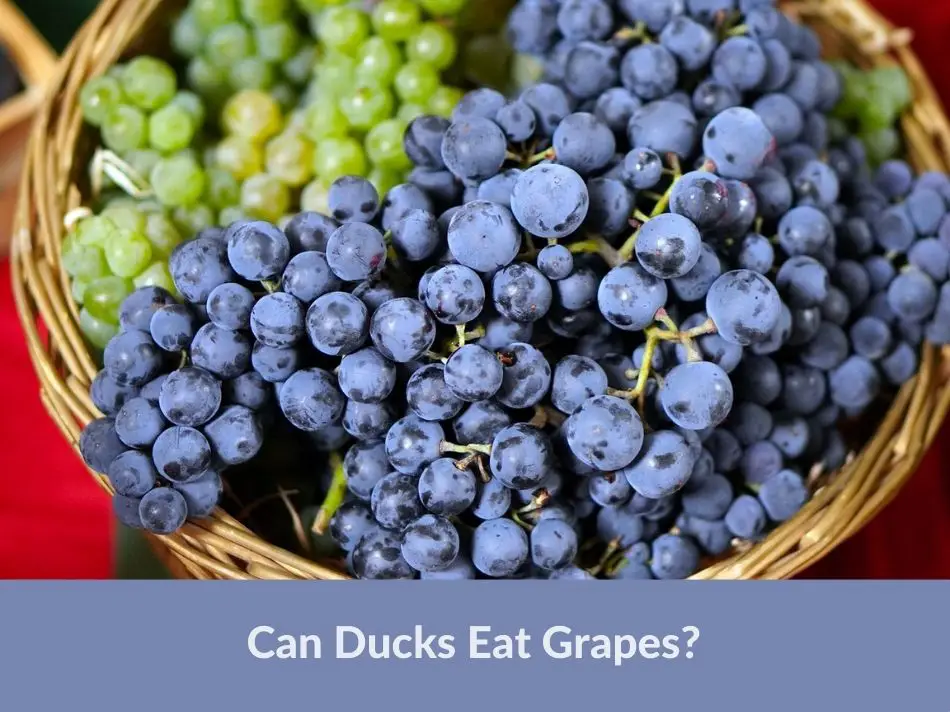Ducks are omnivorous creatures, which means they have a varied diet that includes both plant and animal matter. In the wild, they feast on a smorgasbord of aquatic plants, small fish, insects, and even crustaceans. Domesticated ducks, on the other hand, often enjoy a diet of specially formulated duck pellets, grains, and an assortment of fruits and vegetables. But, can ducks eat grapes?
Yes, ducks can eat grapes. Grapes are a safe and enjoyable treat for ducks when given in moderation. They are soft, juicy, and easy for ducks to digest. But, it’s very important to cut them into smaller pieces to avoid the risk of the duck choking.
In this article we will explain why ducks can eat grapes as well as some health benefits.
How Often Can I Feed My Ducks Grapes?
While grapes are a delightful treat, they shouldn’t form the bulk of a duck’s diet. Think of grapes as an occasional snack rather than a staple food. Offering grapes once a week in small quantities is sufficient. Overfeeding grapes can lead to nutritional imbalances, as they don’t provide all the essential nutrients that ducks require.
Can Ducklings Eat Grapes?
Ducklings have a more sensitive digestive system compared to mature ducks. While it’s not harmful for ducklings to consume grapes, it’s best to wait until they are a bit older and have been introduced to a variety of other foods first.
If you do decide to give grapes to ducklings, ensure they are chopped into very small pieces to prevent choking.
Grapes Nutritional Value
Below is the nutritional value of one cup grapes.
- Calories: 104
- Carbs: 27 grams
- Protein: 1 gram
- Fat: 0.2 grams
- Fiber: 1.4 grams
It also contains several vitamins and minerals as listed below.
- Copper
- Vitamin K
- Thiamine (vitamin B1)
- Riboflavin (vitamin B2)
- Vitamin B6
- Potassium
- Vitamin C
- Manganese
- Vitamin E
[Source]
Are Grapes Healthy for Ducks?
In moderation, grapes can be a healthy treat for ducks. The vitamins and minerals present can supplement their regular diet. However, it’s crucial to balance grape treats with other foods to ensure ducks receive a well-rounded diet.
Too much grapes can lead to obesity and other health issues due to their sugar content. Below are some benefits to ducks eating the vitamins and minerals that can be found in grapes.
- Copper: Essential for red blood cell formation, copper ensures ducks have a healthy circulatory system and supports strong bone development.
- Vitamin K: Vital for blood clotting and bone health, Vitamin K prevents excessive bleeding and maintains sturdy bones in ducks.
- Thiamine (Vitamin B1): Thiamine boosts energy metabolism, converting food into energy to keep ducks active and lively.
- Riboflavin (Vitamin B2): This vitamin aids in maintaining good vision and skin health, ensuring ducks remain vibrant and energetic.
- Vitamin B6: Key for brain health and protein metabolism, Vitamin B6 keeps ducks mentally sharp and efficiently processes their protein intake.
- Potassium: Crucial for muscle function, potassium ensures ducks move with ease, whether swimming or flying, and helps maintain fluid balance.
- Vitamin C: Beneficial for skin, feather, and beak health, Vitamin C also aids in wound healing and offers antioxidant properties.
- Manganese: Supporting bone formation and metabolic activities, manganese ensures ducks have a strong skeletal structure and effectively process their food.
- Vitamin E: An antioxidant, Vitamin E protects duck cells from damage, boosts immune function, and promotes healthy skin and feathers.
How To Feed Grapes To Ducks
- Size Matters: Always cut grapes into halves or quarters before offering them to ducks. Whole grapes can pose a choking hazard, especially for smaller ducks or ducklings.
- Wash Thoroughly: Ensure that the grapes are washed properly to remove any pesticides or chemicals that might be present.
- Limit Quantities: Remember, grapes are treats. A few pieces per duck during treat time is more than enough.
- Variety is Key: Along with grapes, introduce other fruits and vegetables to your ducks’ diet. This ensures they receive a range of nutrients.
- Water: Always make sure that the ducks have access to fresh water.
More Fruits & Vegetables Ducks Can Eat
Grapes are not the healthiest option when it comes to duck snacks and below are some better alternatives that you should consider:
Remember to view our complete list of duck-friendly fruits.
Conclusion
Ducks can indeed enjoy the juicy goodness of grapes, but like all treats, moderation is the key. By ensuring that grapes are prepared safely and given in limited quantities, duck enthusiasts can provide a delightful snack for their feathered friends.
Disclaimer: The information in this article is for informational purposes only. I'm not an expert or a veterinarian.


